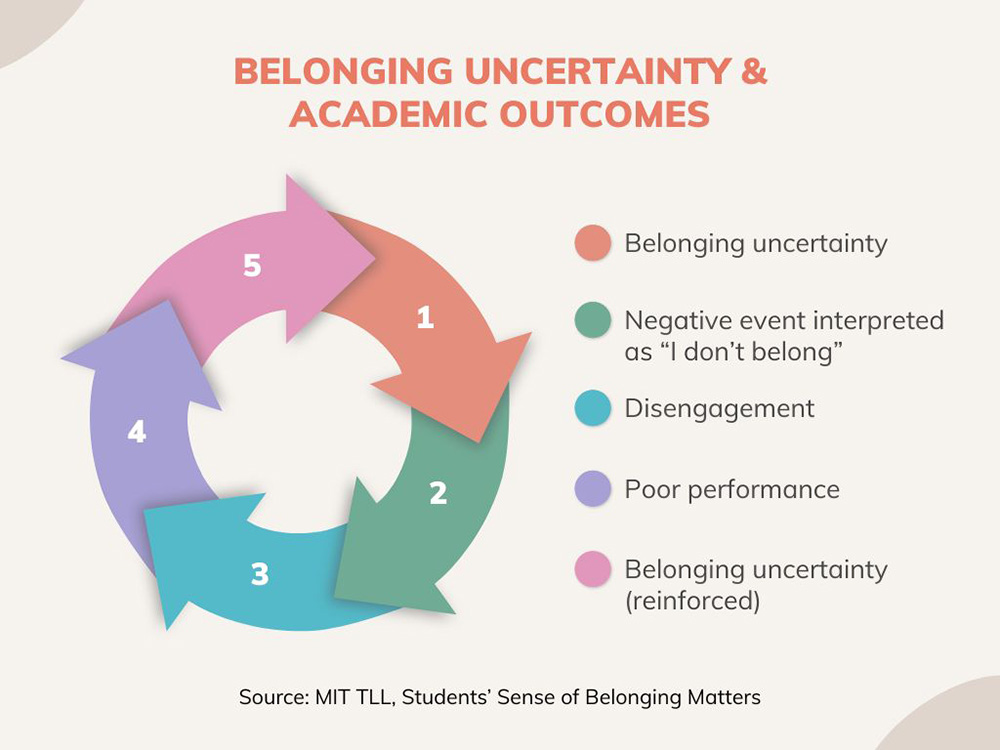Getting into university should be a moment of pride, but for some it brings doubt instead. What stops them from feeling at home on campus?

When Nadine Cavigioli walked onto the campus of a top UK university to start her doctoral studies, she felt massively out of place. The tall, historic buildings and grand stone halls felt uncomfortable and unfamiliar. It was a world away from the small, friendly art college where she began her journey.
As a first-generation university student from a working-class background, she had already broken new ground for her family. Her mother was a single parent on a very low income, and no one in her family had ever attended university before.
“I felt like I had stepped a bit too far, doing a doctorate with my background,” says Dr Cavigioli. “I felt quite alien in that space, and I kept thinking I was going to get found out even though I got a distinction from my master’s.”
The doctorate brought pressures she hadn’t expected. Unlike many full-time students who could focus solely on their studies at the research-intensive university, she was managing multiple responsibilities at the same time, making the academic challenge feel overwhelming.
“From the staff’s perspective, they felt I was more than prepared and able to do the doctorate, but psychologically it felt massive,” says Dr Cavigioli. “I wasn’t just doing a doctorate, I was being a mother, I was a teacher, so juggling all these different commitments.”
These feelings are often called imposter syndrome. In fact, many students experience imposter syndrome, which is when they feel that they aren’t good enough and question their own abilities even when they are doing well.
I felt quite alien in that space, and I kept thinking I was going to get found out even though I got a distinction.
– Dr Cavigioli
While imposter syndrome was reported across all groups, it was much more common among students whose parents hadn’t been to university. About 23% of these students said they felt like imposters, compared to just 2% of students with university-educated parents. In total, 72% of all mentions of imposter syndrome came from students who were the first in their family to go to university, according to a recent study published in Chemical Science.
UCL student Jade Burroughs described similar feelings in a student blog about her first-year experience at the Russell Group university.
Coming from a small town with unemployed parents, Jade found herself monitoring her speech and mannerisms during freshers’ week. She was anxious not to let any pronunciation escape that might expose her working-class background to her more privileged peers.
“Being one among very few in my sixth form to make it into university at all, let alone a Russell Group, made me acutely aware that people like me didn’t go to places like this,” Jade wrote.
Today, Dr Cavigioli works as deputy programme manager at the University of Leeds’ Lifelong Learning Centre, helping other students navigate these same challenges. Her role has given her unique insights into why so many working-class students struggle with belonging at university.
Most of her students are mature, part-time learners who are first-generation university students from working-class backgrounds. They arrive feeling overwhelmed by an academic world that seems designed for people unlike them.
“Most of the students I teach typically had a gap in their education and are coming to university later in life,” she says. “So quite often they arrive feeling really overwhelmed with navigating university campus, all the terminology that we use, like seminars, mitigating circumstances, personal tutor, not necessarily understanding what these things mean if you’re first in family as well.”

It is not only about confidence. For many working-class students, the challenges are not only emotional. They are also practical and affect what students can actually access. As universities rely more on digital tools, students without the right devices or stable internet often struggle to keep up.
“Someone can say they’ve got a laptop, but that doesn’t mean anything,” says Dr Cavigioli. “You could have a laptop, but if you’re sharing it with five people, will you be able to really use it for your coursework?”
Digital access also gets in the way. “We’ve had students submit assignments on their telephone because they don’t have a laptop,” she says. “There can be assumptions that all students arrive with the technology and access, that everybody’s got broadband, laptop and smartphone, and that isn’t really the case. Or they can have a device, but it’s so old that new software won’t download. It can create a real divide.”
Financial pressures compound these difficulties. The shift from grants to loans has fundamentally altered the university experience for working-class students. Where Dr Cavigioli once received full support as a single mother’s daughter, today’s students face mounting debt alongside expensive living costs.
Graduates in England now leave university with an average debt of £44,940, according to a 2024 report by BBC News based on data from the Student Loans Company. In some cases, the numbers are far higher. The report revealed that one graduate had an outstanding debt of £230,000, while another had already repaid more than £110,000.
The National Union of Students called the figures an “indictment” of the education system and the Sutton Trust warned that such debt levels discourage working-class students from entering higher education.

Among the many financial pressures students face, rent is often the most immediate and difficult to manage. “The student accommodation is so expensive,” Dr Cavigioli says. “There’s a hierarchy where some students can afford to live in nice clean safe areas while others might have to live further away from campus in areas that don’t feel as safe.”
Nearly three in five students (59%) say they struggle with the cost of rent at least some of the time, and 17% face it as a constant problem, according to the National Student Accommodation Survey 2025 by Save the Student.
Even small expenses can quietly separate students. “Just going to get a cup of coffee and a cake on campus for some students isn’t accessible, so that can really impact their socializing with others,” says Dr Cavigioli.
On campus, coffee isn’t just a drink. It’s where conversations happen after class, where friendships are built, and where ideas are exchanged. If you can’t afford to join, you’re not just missing the drink. You’re missing a part of the university experience. Others are chatting over coffee, and you are alone in the library, tired and trying to focus.
“And if you’re worrying about money or if you don’t feel comfortable in your accommodation, if it’s too cold, if it’s too noisy, how are you then expected to be able to focus on your studies?” says Dr Cavigioli.
Having a student loan is such a challenge. This business model doesn’t feel like it’s really working to me.
– Dr Cavigioli
These daily struggles are made worse by a lack of understanding from staff. Dr Cavigioli points out that many university teachers come from middle-class backgrounds and may unknowingly reinforce stereotypes about working-class students through their comments or assumptions.
“A lot of our students have been labelled in one way or another as not being intelligent, and it could just take one teacher to say something,” she says. “We’ve had students tell us how they were stereotyped by teachers because of their background. It’s quite a middle-class profession in terms of teaching, so there’s been quite a lot of our students that talk about things not going well at secondary school.”

This exclusion that working-class students feel at university actually starts much earlier in their educational journey. Parvathi Sajiv, a former University Access Officer at The Access Project, works with schools across the UK and sees how the barriers begin building years before university applications. The views she shares are based on her years of experience in the field.
The planning required starts surprisingly early and is staggering in its complexity. “There’s definitely that gap of knowledge in terms of what one needs to do to go to university,” says Parvathi.
“If you want to go to Oxford or Cambridge, they need you to have GCSE grade 7 and above. If you know you need to get a 7, you need to choose the right subjects from year 9 onwards. Students need to know that if they’re looking at Oxford or Cambridge, they should start thinking about these things very early on,” Parvathi explains.
Many, however, never receive that guidance. “A lot of times students, because of lack of resources or lack of access to that knowledge, are not able to start,” she says. Without someone to help them understand which subjects to pick, or how their choices affect future opportunities, many fall behind long before they reach the application stage.
The early challenges are not only about missing guidance. Dr Emily Magrath, Director of Programme Development and Impact at IntoUniversity, says many children from low-income families begin school already behind their more affluent peers.
“We have evidence that the young people that we work with are less likely to have the same level of attainment, such as vocabulary or reading age, when they start school,” she says. “So there’s always a learning gap they have to overcome to catch up, which is difficult.”
That gap does not disappear with time. Even when students stay motivated and keep working hard, it can take them much longer to reach their goals. Dr Magrath remembers working with a young woman who wanted to be a doctor. “She didn’t get the grades to study medicine straight away,” Dr Magrath says, “So she went to study biomedical science instead. I worked here about eight years and I think she’s just in her second year of medicine now. It’s taken her a long time to get there.”
If mentors come from similar backgrounds, that can always be a powerful thing.
-Dr Magrath
Every step becomes more difficult for young people who are beginning behind. That is why effective support cannot be put off until the student reaches university. Instead, it needs to start early and continue throughout the whole of their journey.
At IntoUniversity, Dr Magrath says mentoring helps students grow not only in their schoolwork, but also in their confidence and future planning. Some mentors support students with subjects like maths or English. Others help them build social skills, speak up, or explore careers and university options. The most powerful part, she says, is when mentors come from similar backgrounds.
“If mentors come from similar backgrounds, that can always be a powerful thing,” Dr Magrath says. “To be able to show, ‘I just did this journey a couple of years before. This is how I did it,’ and connect young people to that as well.” Representation matters, she adds, because seeing someone like you succeed helps you believe you can do it too.
Dr Caviglioli applies this principle in her teaching. She is open with students about where she comes from. “I’m very visible about my background and when I interview students, I’m open and I say I’m the first in my family to go to university. I’m from a working-class background, I grew up with quite limited access to resources because of our financial situation. And it can help people feel like, oh, okay, this staff member is gonna understand,” she says.
Personal support helps, but it cannot fix everything. “Obviously there’s lots of staff that do brilliant work in the sector that really go above and beyond. But again, it can be very sort of hidden. It’s frustrating to hear there’s still people that think we live in a class-free society and that working-class students don’t exist,” Dr Caviglioli says.
This lack of recognition reflects deeper problems. “If we could actually collect data on working-class students as well, we currently don’t, because it’s not a protected characteristic. And so that’s the issue, we don’t really understand our working-class students in terms of specifically that kind of culture and community. It’s measured in other ways which are imperfect,” Dr Caviglioli says.
The funding model compounds these problems. “Having a student loan is such a challenge. This business model doesn’t feel like it’s really working to me. If we could go back to the grants that students don’t have to pay back, that’d be brilliant.”
“I find it really hard, it’s quite emotional work and it’s disappointing to see that we’re in 2025 and people are struggling as much as they are. There’s a whole list of things that we could be doing better,” says Dr Caviglioli.